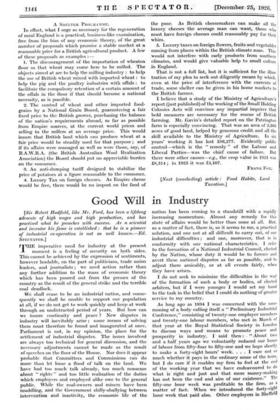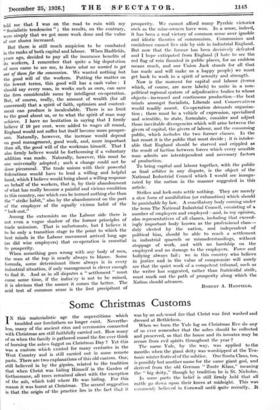Good Will in Industry
[Sir Robert Hadfield, like Mr. Ford, has been a lifelong advocate of high wages and high production, and has practised what he preaches with success. As a scientist and inventor his fame is established : that he is a pioneer of industrial co-operation is not So well known.—Ed.
SPECTATOR.]
THE imperative need for industry at the present moment is a feeling of security on both sides. This cannot be achieved by the expression of sentiments, however laudable, on the part of politicians, trade union leaders, and journalists ; we need action rather than any further addition to the mass of economic thebry which has been poured out from the presses of the country as the result of the general strike and the terrible coal deadlock.
'We shall cease to be an industrial nation, and conse- quently we shall be unable to support our population at all, if we do not get to work quickly and keep at work through an undistracted period of years. But how can we insure continuity and peace ? New disputes in industry will inevitably arise ; some means of solving them must therefore be found and inaugurated at once. Parliament is not, in my opinion, the place for the settlement of industrial disputes. The issues involved are always too technical for general discussion, and the necessary adjustments cannot be made as the result of speeches on the floor of the House. Nor does it appear probable that Committees and Commissions can do more than let loose a flood of talk on the land. We have had too much talk already, too much nonsense abOut " rights- " and too little realization of the duties which employers and employed alike owe to the general public. While the coal-owners and miners have been muddling, and the Government shilly-shallying between intervention and inactivity, the economic life of the nation has been coming to a standstill with- a rapidly increasing momentum. Almost any remedy for this state of affairs would be better than none at all. But, as a matter of fact, there is, so it seems to me, a practical solution, and one not at all difficult to carry out, of our industrial' difficulties ; and one, moreover, that is in conformity with our national characteristics. I refer to the formation of a National Industrial Council, elected by the Nation, whose duty it would be to foresee and avert these national disputes as far as possible, and to adjust them amicably, or at all events fairly, when they have arisen.
I do not seek to minimize the difficulties in the way of the formation of such a body or bodies, of elected arbiters, but if I were younger I would set my hand to the task in the belief that I could do nothing of greater service to my country.
As long ago as 1894 I was concerned with the mum moning of a body calling itself a " Preliminary Industrial Conference," consisting of twenty-one employer members and twenty-one labour members, who met in March of that year at the Royal Statistical Society in London to discuss ways and- means to promote peace and prosperity in industry. r said then " About two -and a half years ago we voluntarily reduced our hours of labour from fifty-four to fifty-one and we hope shortly to make a forty-eight hours' week. . . . I . care not so much whether it pays in the ordinary sense of the term, but do care if it enables my firm to feel at the end of the working year that we have endeavoured to do what is right and just and that mere money-making has not been the end and aim of our existence." The fifty-one hour week was profitable to the firm, as a matter of fact. When we introduced:- the forty- eight hour week that paid also. Other employers in Sheffield told me that I was on the road to ruin with my " Socialistic tendencies " ; the results, on the contrail-, were simply that we got more work done and the value of our shares increased.
But there is still much suspicion to be combated in the ranks of both capital and labour. When Hadfields, years ago, decided to pay all the insurance benefits of its workers; I remember that quite a big deputation of men came to see me, to learn what we wanted to get out of them for the concession. We wanted nothing but the good will of the workers. Putting the matter on the lowest terms, this good will has a cash value : I should say every man, in works such as ours, can save the firm considerable sums by intelligent co-operation. But, of course, really, the amount of wealth (for all concerned) that a spirit of faith, optimism and content- ment can produce is incalculable. There is no limit to the good about us, or to what the spirit of man may achieve. I have no hesitation in saying that I firmly believe if 10 per cent, were added to wages all round, England would not suffer but itself become more prosper- ous. Naturally, however, the increase would depend on good management, good work, and, more important than all, the good will of the workman himself. That I also firmly believe would be forthcoming if a voluntary addition was made. Naturally, however, this must be one universally adopted ; such a change could not be done piecemeal. The trade unions with their powerful federations would have to lend a willing and helpful hand, which I believe would bring about a willing response on behalf of the workers, that is, by their abandonment of what has really become a painful and vicious condition in this country, one which can be termed nothing else than the " strike habit," also by the abandonment on the part of the employer of the equally vicious habit of the " lock-out."
Among the extremists on the Labour side there is not even a vague shadow of the former principles of trade unionism. That is unfortunate, but I believe it to be only a transition stage to the point to which the best minds in the Labour movement arrived long ago (as did wise employers) that co-operation is essential to prosperity.
When something goes wrong with any body of men, the man at the top is nearly always to blame. Some formula, some determinant there always is in every industrial situation, if only management is clever enough to find it. And as in all disputes a " settlement " must come some time, if the industry is not to be ruined, it is obvious that the sooner it comes the better. The acid test of common sense is the first precipitant of prosperity. We cannot afford many Pyrrhic victories such as the mine-owners have won. In a sense, indeed, it has been a real victory of common sense over ignoble and idiotic theories of communism. Communism and confidence cannot live side by side in industrial England. But now that the former has been decisively defeated and I hope extirpated from England (I hate to see the red flag of ruin flaunted in public places, for an emblem means much, and our Union Jack stands for all that has made and will make us a happy people) we must get back to work in a spirit of serenity and strength.
Now is the moment for capital and labour (terms which, of course, are mere labels) to unite in a non- political regional system of adjudicative bodies to whose objects—increased and continuous production—the best minds amongst Socialists, Liberals and Conservatives would readily assent. Co-operation demands organiza- tion ; there must be a vehicle of expression, specialized and scientific, to state, formulate, consider and adjust those inevitable divergencies which will arise between the givers of capital, the givers of labour, and the consuming public, which includes the two former classes. In the last resort it is the public that must decide ; it is intoler- able that England should be starved and crippled as the result of faction between forces which every sensible man admits are interdependent and necessary factors of production.
To bring capital and labour together, with the public as final arbiter in any dispute, is the object of the National Industrial Council which I would see inaugu- rated by the nation in the manner suggested in this article.
Strikes and lock-outs settle nothing. They are merely a slow form of annihilation (or exhaustion) which should be punishable by law. A conciliatory body coming under the term The National Industrial Council, consisting of a number of employers and employed—and, in my opinion, also representatives of all classes, including that exceed- ingly important body the as the professional class— duly elected by the nation, and independent of political bias, should be able to reach a settlement in industrial quarrels or misunderstandings, without stoppage of work, and with no hardship on the employed and no damage to the employers. Force and bullying always fail ; we in this country who believe in justice and in the value of compromise will surely see that the quiet work of a competent tribunal, such as the writer has suggested, rather than fratricidal strife, must mark out the path of prosperity along which the Nation should advance.
ROBERT A. HADFIELD.



































 Previous page
Previous page